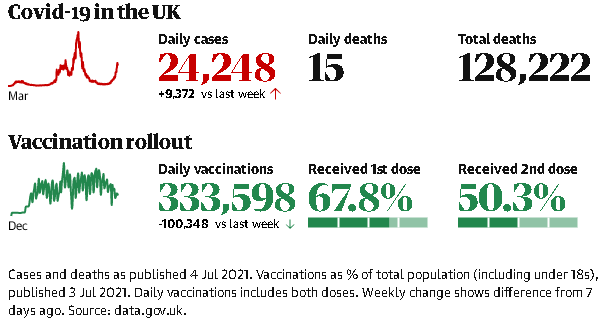Experts react with dismay to ‘frightening’ attitude of Sajid Javid towards removing protections
UK scientists have warned that the lifting of all Covid-19 restrictions is like building new “variant factories” at a very fast rate, and said the attitude of the new health and social care secretary, Sajid Javid, is “frightening”.
Writing in the Mail on Sunday, Javid said the best way to protect the nation’s health was by lifting the main Covid-19 restrictions. “Rules that we have had to put in place have caused a shocking rise in domestic violence and a terrible impact on so many people’s mental health,” he said.
Reacting to the comments, Prof Stephen Reicher at the University of St Andrews, a member of the Sage subcommittee advising on behavioural science, tweeted: “It is frightening to have a ‘health’ secretary who still thinks Covid is flu. Who is unconcerned at levels of infection. Who doesn’t realise that those who do best for health, also do best for the economy. Who wants to ditch all protections while only half of us are vaccinated.
“Above all, it is frightening to have a ‘health’ secretary who wants to make all protections a matter of personal choice when the key message of the pandemic is “this isn’t an ‘I’ thing, it’s a ‘we’ thing.”
On Monday, the cabinet is expected to sign off the easing of various Covid restrictions in England, including allowing fully vaccinated adults to travel to amber-list countries without having to self-isolate when they return; making the wearing of face masks voluntary, apart from in hospitals and other healthcare settings; and no longer requiring fully vaccinated adults to take a Covid-19 test or self-isolate or if they’ve come into contact with an infected person.
The school “bubbles” system that has forced hundreds of thousands of pupils to self-isolate at home, if someone in their bubble tests positive, is also expected to be dropped; while pub and restaurant customers may no longer have to scan an NHS QR code upon their arrival.
Javid said: “We need to be clear that cases are going to rise significantly. I know many people will be cautious about the easing of restrictions – that’s completely understandable. But no date we choose will ever come without risk, so we have to take a broad and balanced view.
“We are going to have to learn to accept the existence of Covid and find ways to cope with it – just as we already do with flu.”
Prof Susan Michie, the director of the Centre for Behaviour Change at University College London, and another member of Sage’s behavioural science subcommittee, tweeted: “Allowing community transmission to surge is like building new ‘variant factories’ at a very fast rate.”

Writing in a blog for the British Medical Journal last week, Michie, together with Reicher and Prof Ann Phoenix at UCL’s Institute of Education, said Javid’s singular emphasis on the responsibility of individuals to identify and mitigate against Covid-19 risks, took the emphasis away from what the government must also do.
“If people are to act responsibly they need their government to fulfil its own responsibilities to make safe behaviour possible,” they said. “The fear is that when government talks about a “freedom day” when all restrictions are lifted, it doesn’t mean that the virus has gone away, and it doesn’t mean that measures are not needed to prevent a resurgence.
“What it does mean is that the government is planning to withdraw all forms of support and abandon us to deal with the pandemic on our own.”
However, other scientists said the relaxation of many of the restrictions, while not risk-free, made sense. Paul Hunter, professor of medicine at the University of East Anglia, said: “Double-vaccinated people are less likely to get an infection and even if infected are less likely to infect others.”
Similarly, he said the additional risk posed by relaxing mask-wearing was unlikely to be great – although it made sense for vulnerable groups to wear them in crowded indoor environments, and for those visiting very vulnerable individual indoors – at least while community rates remained high.
“The school bubble system may have had some value, but if we accept that we are all going to get repeated Sars-CoV-2 infections throughout life, and we are unlikely to vaccinate children under 11, and may not vaccinate children from 11 to 16, then all this can be said to be doing is delaying the inevitable. This is causing considerable disruption for relatively little benefit,” Hunter said. “Even relying on daily testing of asymptomatic individuals is open to debate.
“Of course, we have seen new issues appear during the course of this epidemic and so no one can be certain of the challenges over coming months, but we will eventually come into an equilibrium with this virus as we have with all the other endemic respiratory infections.”
Prof Allyson Pollock, clinical professor of public health at Newcastle University, said Javid’s approach was “sensible”. She said: “Population immunity is rapidly being achieved due to a combination of naturally acquired immunity through infection and vaccination. Unknowns are duration of immunity, impact of variants and who is at individual risk of reinfection or transmission.
“Good infection and outbreak control measures are still important at local level. However, mass testing and daily testing should be stopped, as testing of asymptomatic people is causing unnecessary harms with no evidence that it contributes to reducing transmission.”















